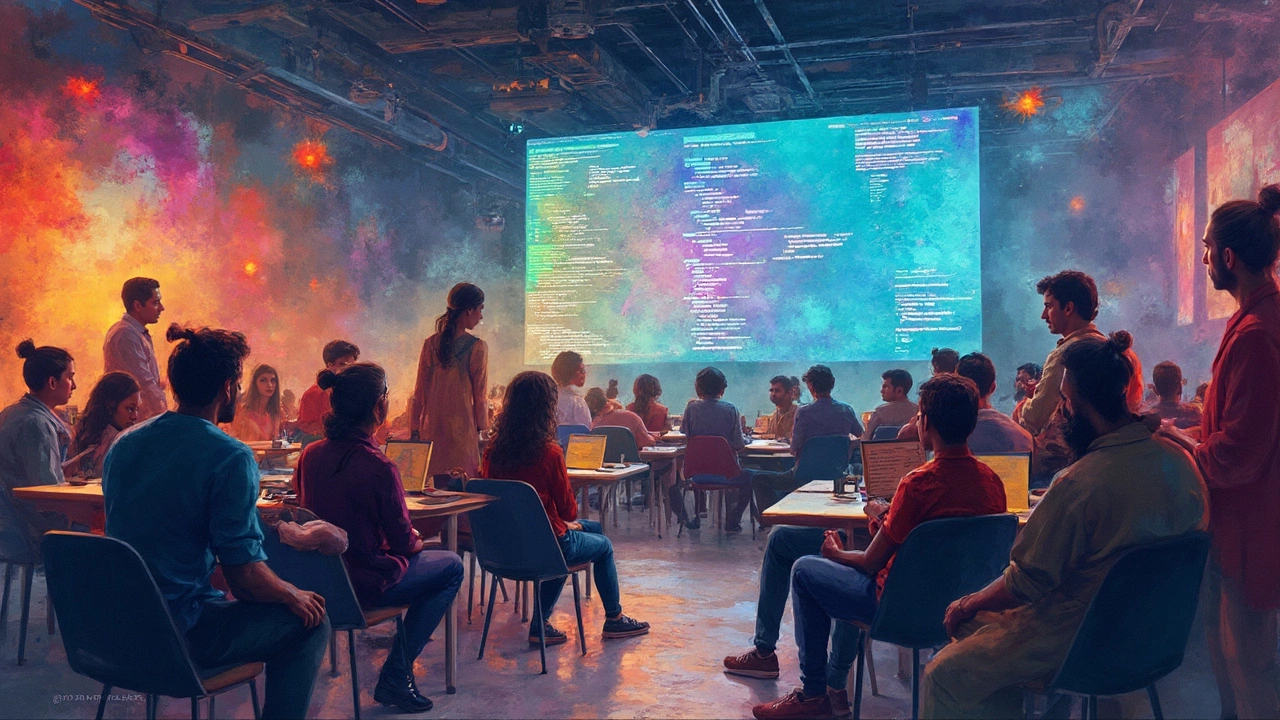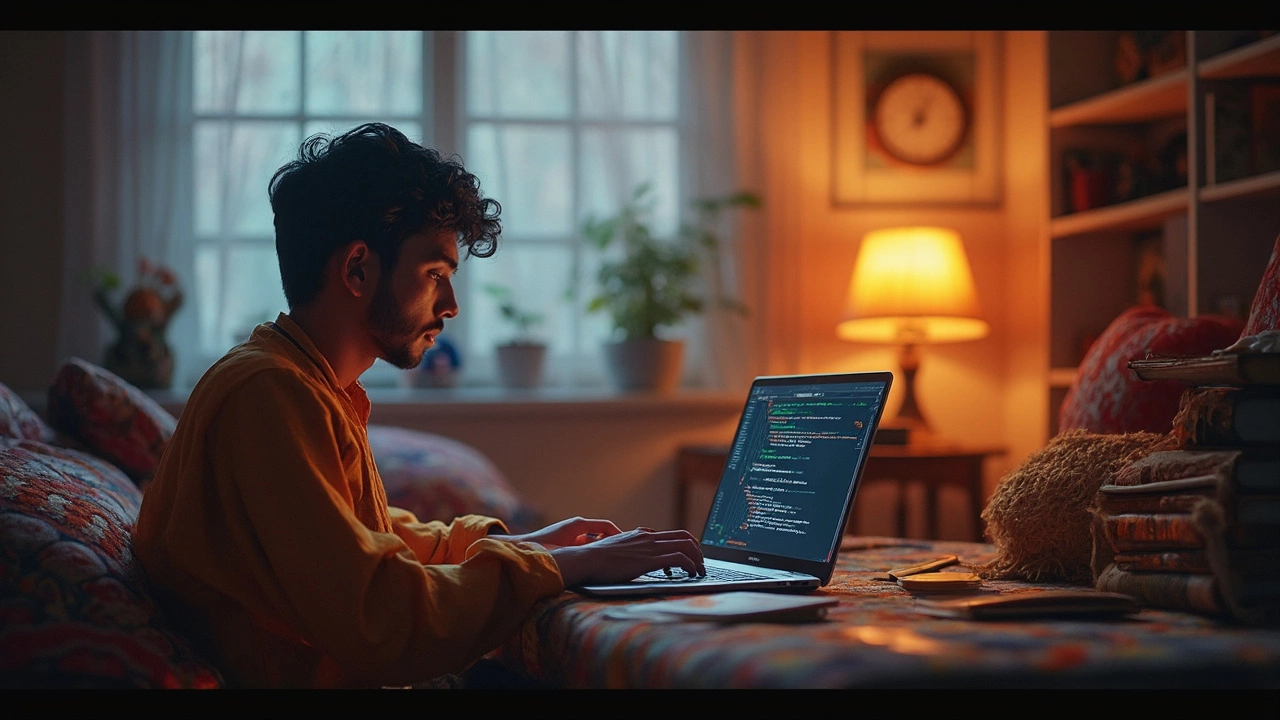Does Coding Ever Get Easier? Tips and Truths for New Coders

Have you ever felt like throwing your laptop out the window while learning to code? Trust me, you're not alone. Getting started with coding can feel like wrestling a beast—everything's foreign, nothing makes sense, and error messages seem to come from another dimension.
But here's a little secret: coding does get easier. Sure, it takes time, patience, and the occasional pep talk. Think of it like learning to ride a bike—a bit wobbly and full of tumbles at first, but eventually, you find your balance.
The key is persistence and finding the right learning strategies that work for you. Plenty of seasoned coders will tell you that the hardest part is just sticking with it through the initial confusion. Let's dig into some practical tips and see how you can smooth out the early bumps in your coding journey.
- The Initial Struggle
- Overcoming the Learning Curve
- Tips from Experienced Coders
- Common Misconceptions
- Resources to Help You Out
- Keeping Motivation Alive
The Initial Struggle
When you first dive into coding, it can feel like you're trying to read hieroglyphics without the Rosetta Stone. Languages like Python, JavaScript, or Java might seem like a jumble of confusing syntax and bizarre rules. It's normal to feel lost at the beginning. Heck, you might even mix up Python with an actual snake—just kidding, but you get the point.
Many coding beginners find themselves overwhelmed because they expect to master everything overnight. Let's clear this up: coding is not magic; it takes time to understand how everything fits together. You might hear terms like variables, loops, and arrays and wonder if you'll ever make sense of them. Spoiler alert: you will.
Understanding Common Frustrations
One of the biggest hurdles in learning to code is debugging. The reality is, errors are your new best friends—and I mean that in the most loving way possible. Each error teaches you something new about how your code is supposed to work. It might take hours staring at lines of code and searching forums for help, but figuring out a solution is incredibly rewarding.
Let's face it, finding reliable resources is also part of the struggle. It seems like there's an endless sea of tutorials and online coding classes, and knowing which ones are worth your time can feel like a quest on its own. There are some gems out there, but it's important to remember not to spread yourself too thin trying to do everything.
Getting Past the Fear Factor
Emotional barriers can be just as challenging. Imposter syndrome is real, and many beginners feel like they’ll never be as skilled as those experienced programmers they look up to. Relax, everyone starts somewhere!
According to a recent survey, about 60% of new coders quit within the first year because they think they're not cut out for it. But here's the truth: persistence and a bit of grit are your best allies. Instead of comparing yourself to others, focus on your progress—small wins are still wins.
Before you know it, what used to make you want to pull your hair out will become second nature. Remember, you don't need to understand it all immediately; just take it one step at a time, and soon enough, you'll navigate through this maze like a pro.
Overcoming the Learning Curve
Ah, the dreaded learning curve that every budding programmer faces. The good news? It’s not as steep as it looks once you break it down. The trick is tackling small, manageable pieces. Rome wasn’t built in a day, and neither is coding expertise.
Start Small and Build Up
When you're just starting, it's tempting to dive into complex projects. But here's the thing—you'll learn faster by starting with the basics and slowly adding layers of complexity. Begin with simple programs to get the hang of the syntax and logic. Try creating a basic calculator or a rock-paper-scissors game before moving on to more intricate projects.
Practice Regularly but Don’t Overwhelm Yourself
Coding is a skill, and like any skill, it gets better with regular practice. Make it a part of your daily routine, even if it's just for 15-30 minutes a day. Consistency is key here. But remember, quality over quantity. A couple of focused hours beat a whole day of mindless coding.
Harness the Power of Resources
The internet is brimming with resources just waiting to be tapped into. Here’s a pro tip: mix it up a little. Use a variety of resources like coding classes, forums, and video tutorials to keep your learning process fresh and engaging. As Steve Jobs once said,
"Everyone should know how to program a computer because it teaches you how to think."
Debugging is Your New Best Friend
Every programmer, no matter how experienced, deals with bugs. Embrace them! Debugging teaches you more about coding than anything else. Each bug is an opportunity to improve your problem-solving skills. And the satisfaction of solving a tricky bug? Unbeatable.
Stay Updated and Keep Learning
The tech world changes faster than you can say "Hello, World!" Stay curious and keep learning new languages and tools. Meetup groups, webinars, and online communities are great places to keep up with the latest trends and network with other coding beginners and experts alike.
Progress Tracking
Ever thought of keeping a coding journal? Documenting your progress can be incredibly motivating. You'll have a clear record of how far you've come and can revisit what you've learned whenever you hit a snag.
And here’s a little nudge: just keep going. Tackling the learning curve isn't easy, but with a strategic approach, you're already on your way to making coding not just an easier task but an enjoyable one too.
Tips from Experienced Coders
Ever wondered what experienced coders wish they knew at the start? They've been through the same confusion and they’re here to sprinkle some wisdom. No secret sauce here, just good old practical advice.
1. Break It Down
One big secret is to break down problems into smaller, manageable parts. This trick can simplify even the most daunting coding challenges. You wouldn’t eat a whole pizza in one bite, right? Apply the same logic to your coding beginners projects!
2. Code Every Day
It sounds cliché, but consistency is key. Coding for just a little each day helps you retain what you’ve learned and keeps the momentum going. Even 30 minutes can make a big difference.
3. Don’t Fear Errors
Think of error messages as friendly nudges in the right direction. Experienced developers will tell you that repeatedly encountering and solving errors is how you learn. Debugging might even become your favorite part.
4. Leverage Resources
Don’t shy away from using resources like Stack Overflow, online tutorials, or coding classes. You’ve got a whole world of knowledge at your fingertips, so use it!
5. Collaborate and Ask!
Don’t struggle in silence. Whether it’s classmates, online forums, or meet-ups, asking questions and getting different perspectives can clarify tough concepts. Learning from others' journeys can spark 'aha' moments in your own.
6. Keep Building
Create projects that excite you, no matter how simple. The sense of accomplishment will keep you motivated and steadily build your skills. It’s all about enjoying the process, not just reaching the goal.
With these tips, your journey in **programming classes** should feel a lot more manageable. Remember, every expert was once a beginner who didn’t quit. Keep at it!

Common Misconceptions
Coding might feel like an enigma wrapped in a riddle, but it's not as mysterious as it seems. Let's bust some of those myths that might be holding you back.
1. You Need to Be a Math Whiz
Many people think that being good at math is a prerequisite for learning how to code. While math certainly helps with areas like algorithms and data structures, you don't need to be a calculus wizard to get your start in programming. In fact, many coding classes focus more on logical thinking and problem-solving than math-heavy formulas.
2. Only Young People Can Learn to Code
This one's a classic. Truth is, coding is accessible to anyone willing to put in the effort, regardless of age. There's a great story of a grandma in her 80s who learned to code to build an app for her book club. Whether you're fresh out of school or considering a career change later in life, the doors of coding are wide open.
| Age Group | Percentage of Learners |
|---|---|
| 18-24 | 40% |
| 25-34 | 35% |
| 35-44 | 15% |
| 45+ | 10% |
3. Coding is Just Type and Syntax
It's easy to think coding is all about typing endless lines of confusing syntax. In reality, coding is more like solving puzzles. It engages your creativity and reasoning. Sure, some syntax is essential, but once you grasp the logic behind the code, it becomes much like piecing together a jigsaw.
4. Learning to Code Means Learning Just One Language
Some newcomers believe mastering one programming language is enough. While focusing on one language is a great way to start, being a skilled coder often means becoming at least familiar with a few other languages. JavaScript might be ideal for web development, while Python is great for data science.
Feeling overwhelmed is common, but remember—every skilled coder was once a beginner. Understanding these misconceptions can ease your journey into the vast, rewarding world of programming.
Resources to Help You Out
Finding the right tools and platforms can transform your coding experience. Whether you’re dipping your toes in or looking to improve your skills, resources are abundant and accessible, covering everything from coding beginners to advanced programming topics.
Online Platforms
Websites like Codecademy and freeCodeCamp offer interactive courses perfect for programming classes. They focus on hands-on learning through coding challenges and real-world projects. As you build your way up, platforms like LeetCode and HackerRank help polish problem-solving skills with a vast array of coding problems, mimicking what you might encounter in job interviews.
Books for Deep Learning
Sometimes you just need a good book to provide an in-depth understanding. "Clean Code" by Robert C. Martin and "You Don’t Know JS" series by Kyle Simpson are well-recommended for diving deeper into programming concepts. They help make sense of complex topics and enhance your coding literacy.
Video Tutorials
YouTube has become a goldmine for learning code. Channels like Traversy Media and The Net Ninja provide step-by-step video guides ranging from intro lessons to advanced web development tutorials.
Community Support
Never underestimate the power of a community. Stack Overflow is a go-to for coders when hitting a wall. Reddit’s r/learnprogramming or dev.to are also great places to ask questions and share experiences. Sharing your struggles and reading about others can be encouraging and enlightening.
Practice Makes Perfect
The saying is especially true for coding. Websites like practicing platforms, such as Codewars, allow you to tackle coding katas (small coding challenges) and see how others solve problems, promoting different ways of thinking about the same task.
| Platform | Price | Focus Area |
|---|---|---|
| Codecademy | Free/Paid | Broad Programming |
| LeetCode | Free/Paid | Problem Solving Skills |
| freeCodeCamp | Free | Full-Stack Development |
These resources offer a variety of approaches so you can pick the style that fits your needs. Remember, the key is to keep learning and challenging yourself, making the journey smoother and more rewarding.
Keeping Motivation Alive
Staying motivated when you're knee-deep in code can feel like a real uphill battle. But it's totally normal! The trick is to turn this hurdle into something a bit more manageable. So, how do you keep the flame burning when you're just starting on your coding journey?
Set Realistic Goals
Aiming too high from the get-go can lead to disappointment. Instead, start small. Tackling little challenges—like coding a simple calculator or a basic game—is more sustainable and rewarding. These baby steps add up and soon you’ll notice progress, boosting your confidence and motivation.
Celebrate Small Wins
It might sound cheesy, but celebrating every 'aha!' moment helps a ton. Whether it’s fixing a stubborn bug that's been haunting you for days or learning a new function in Python, give yourself credit. Set rewards for milestones, like that fancy coffee you've been eyeing. Trust me, you’ve earned it.
Surround Yourself with Support
Having a support system can be a game-changer. Join online forums or local coding meetups, and get involved in discussions with other beginners or experienced coders. Sites like Stack Overflow or Reddit’s coding communities are gold mines of advice. You’ll quickly find that many programmers have walked in your shoes and are willing to help.
Keep It Fun
Coding doesn’t have to be all work and no play. Dive into projects that excite you. Want to automate your daily tasks or make a unique portfolio website? Go for it! Passion projects make the learning process more enjoyable and less of a chore.
Track Progress
Consider keeping a coding diary or using apps to track your learning journey. Seeing how far you've come can be an unexpected motivation booster. Plus, it’s a great way to identify areas you might want to revisit or skills you’ve mastered.
Remember, coding is a marathon, not a sprint. It’s about learning at your own pace and finding joy in the process. Staying motivated isn't always easy, but with these strategies, you’ll have some solid tricks up your sleeve to keep pushing forward.

